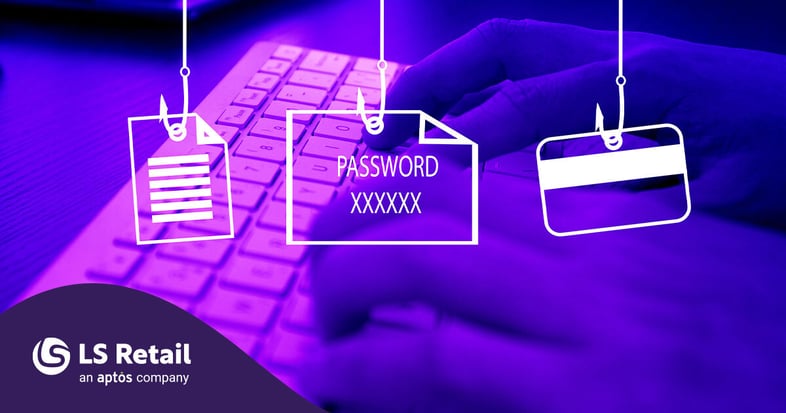
Despite the warnings and headlines, many retailers still make basic security mistakes that leave them vulnerable to cyberattacks. Too often, it’s not a sophisticated breach. Instead, it’s a missed software update, a compromised password, or a staff member who clicks the wrong link.
When a cyberattack took down Marks & Spencer’s digital channels, customers couldn’t place orders, make payments, or click and collect for weeks, costing the UK retailer millions in lost revenue, not to mention the big dent in customer trust. Harrods, the Co-op, and countless other retailers of all sizes have faced similar breaches in recent months. Indeed, ransomware attacks on the retail sector have surged by 37% in just one year, according to the 2025 Data Breach Investigations Report from Verizon.
And if well-established brands with dedicated IT teams can fall victim, what does that mean for the thousands of smaller retailers with fewer resources? It’s a scary thought, but one that every retailer should be asking themselves.
What are the most common cybersecurity mistakes retailers make?
No matter what size retailer you are, having a strong cybersecurity framework can save you from the risks and damages that come with a potential breach. Here are six of the most common cybersecurity mistakes retailers make, and how to steer clear of them:
1. Assuming you won’t be targeted
Many small to mid-sized retailers mistakenly believe that hackers are only interested in large, high-profile brands. However, attackers increasingly use automated tools to scan for weaknesses, making any business, large or small, a potential victim. Ransomware (malicious software that infects systems) now disproportionally affects small organizations, accounting for 88% of security breaches (2025 Data Breach Investigations Report, Verizon).
How to avoid it: Don’t wait to become a target. Every retailer should invest in basic cybersecurity protections, conduct regular risk assessments, and treat security as a core business priority.
2. Using a point of sale with weak security
Point of sale (POS) systems are a goldmine for cybercriminals. If compromised, they can expose vast amounts of private customer data in minutes. In one attack on the UK supermarket chain, the Co-op, hackers accessed personal information, including names and contact details, affecting thousands of users of its online membership services.
How to avoid it: Choose a POS system with built-in protections like end-to-end encryption and tokenization. Make sure it complies with PCI DSS and EMV payment standards to protect cardholder data. LS Pay, for example, safeguards transactions across all channels, so you’re always one step ahead of attackers.
3. Poor password hygiene
Reusing passwords or relying on weak ones gives attackers an easy route into systems. IBM’s 2024 Cost of a Data Breach Report found that compromised password credentials were behind 16% of all security incidents, more than any other single cause; a reminder that even the strongest system is only as secure as its weakest login.
How to avoid it: Enforce strong password policies, encourage the use of password managers, and require multi-factor authentication for access to critical systems.
4. Neglecting employee cybersecurity training
Many breaches start with a simple phishing email, and employees who aren’t trained to spot suspicious messages are much more likely to click on them. Retail staff are increasingly targeted by sophisticated scams designed to slip past technical defenses. In fact, another Verizon report found that over two-thirds of data breaches now involve some form of human error.
How to avoid it: Provide regular training to help staff recognize scams and phishing attempts. Run simulated phishing campaigns, random tests and update employees frequently on evolving threats. Make cybersecurity everyone’s responsibility, not just that of your IT department.
5. Outdated software and systems
In the past 12 months, cybersecurity reports have found that more than 70% of retailers have encountered at least one data breach. Legacy systems, which often lack modern security features, are one of the most common weak links for cyberattacks. When systems aren’t updated and patched regularly, they become easy targets.
How to avoid it: Use a modern cloud-based software solution like LS Central, which automatically updates with all the latest security patches. SaaS software like this offers consistent protection, reduces IT overheads, and helps retailers respond quickly to emerging threats.
6. Lack of a cybersecurity response plan
When a breach happens, being unprepared can make things far worse. Without a robust response strategy, recovery can be slower, more chaotic, and much more expensive. Downtime, data loss, and damaged customer trust can all take months, even years, to recover from. Harrods recently showed how it proactively responds to threats by acting fast and restricting internet access across its sites after detecting an attempted intrusion. Swift coordinated action can be the difference between a minor scare and a major crisis.
How to avoid it: Develop and test a cybersecurity incident response plan. Define roles, response timelines, and escalation procedures. Partner with cybersecurity experts who can step in if needed.
Protect your retail business from cyberattacks
Cyberattacks are a business threat that can hit your operations, bottom line, and reputation all at once. And while the headlines tend to focus on the big names, it’s often smaller retailers that are left most exposed.
The UK’s National Cyber Security Center puts it bluntly: “Cyber criminality, including extortion and ransomware, is one of the most pervasive cyber threats. It affects organizations of all sizes, from the largest, to the very smallest. No one is immune from this threat. It is both opportunistic and indiscriminate.”
In other words, every business is a potential target. Yet with the right systems, processes, and training, you don’t have to be vulnerable. Retail solutions like LS Central, and payments platforms like LS Pay are designed with built-in security, giving you the capabilities to stay protected and continue serving customers without interruption.
Want to find out more? Contact us and we’ll be happy to discuss how we can help you keep your retail business protected.
Cybersecurity in retail FAQ
Why is cybersecurity important in the retail industry?
Retailers handle sensitive customer data, such as payment details, on a daily basis, making retail cybersecurity essential for keeping their information safe. A breach can lead to financial losses, damaged customer trust, and long-term consequences that can sometimes take years to recover from.
What are the most common cyberattacks in retail?
The most common cybersecurity attacks in retail include phishing, data breaches, and malware. That’s why it’s not only important to train employees to report suspicious activity, but to ensure you have robust security measures in place that protect your business.
What are the different cybersecurity challenges in retail?
Cybersecurity challenges in retail include being prepared for sophisticated cyberattacks, such as the increasing appearance of ransomware, human error, managing risks from third-party companies, and vulnerabilities with Point of Sale (POS) systems.
Are there cybersecurity standards or certifications retailers should follow?
Retailers should look for software solutions that are compliant with a number of industry standards and essential certifications, such as PCI DSS (Payment Card Industry Data Security Standard) to ensure secure handling of payment data.
And if you use a retail software platform like LS Central, which extends Microsoft Dynamics 365 Business Central ERP, you’re backed by SOC 1, SOC 2, ISO 27001 , ISO 27017, and ISO 27018 compliances to help you meet the highest security standards.

